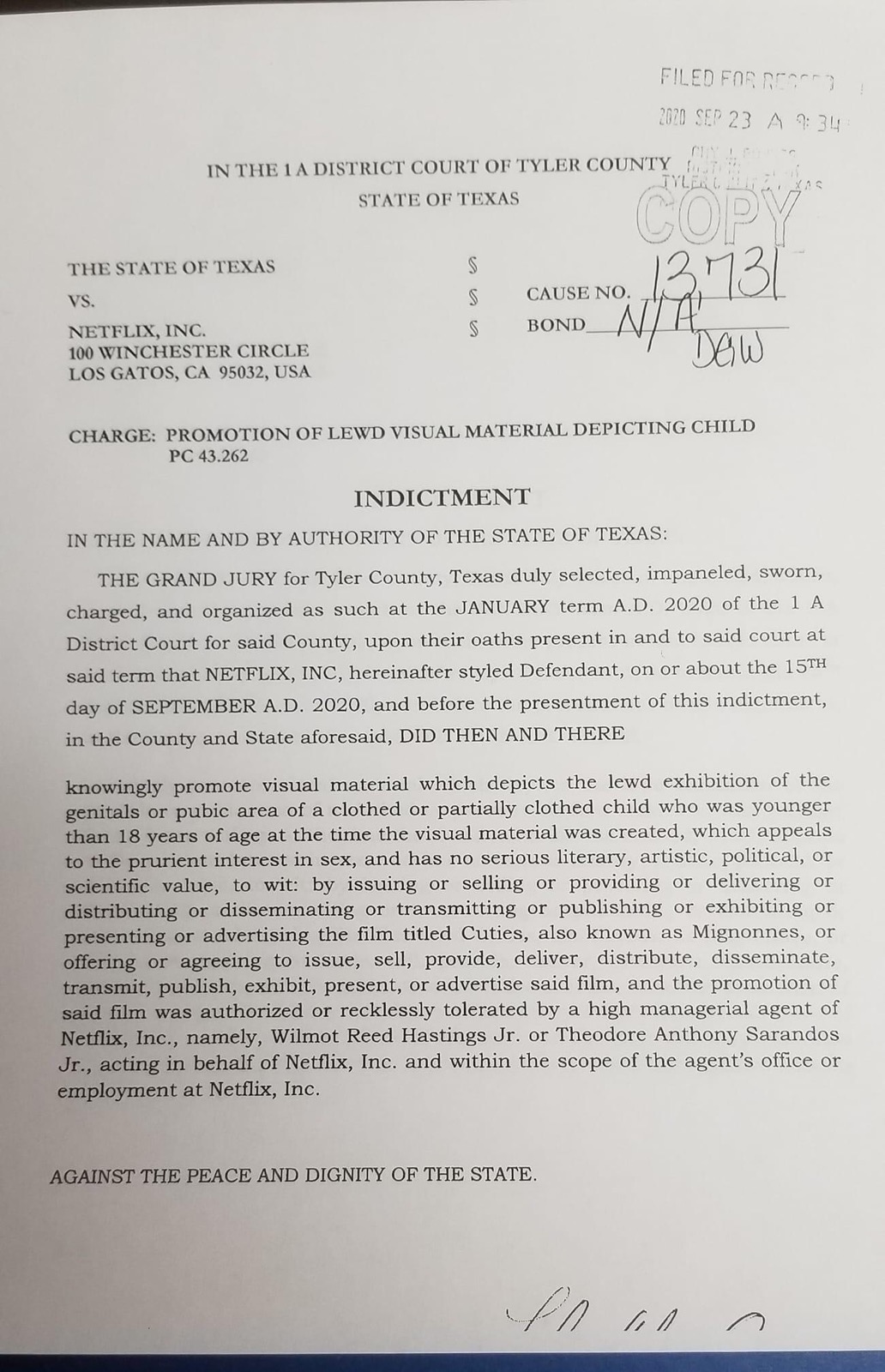Not Cute: The Sexualization of Youth in Netflix’s Mignonnes
Mignonnes, or Cuties in English, is a French coming-of-age drama that garnered criticism for its hypersexualization of young girls. The scrutiny began in August when Netflix released an explicit poster advertising the movie and has continued through the movie’s release, despite the poster’s recall.
Cuties follows eleven-year-old Amy, a Senegalese Muslim girl who defies her conservative family after her father leaves to procure another wife. She joins a provocative dance crew of young girls called the “Cuties,” dresses revealingly, and even posts a photo of her genitalia on the internet. Throughout the film, Amy strives for the ideals she sees in hypersexualized online trends.
The film highlights the dichotomy of two extreme and conflicting kinds of femininity: one of modesty dictated by her family and the other of sexuality determined by a secular Western society that seemingly has no boundaries.
The film incorporated director Maïmouna Doucouré’s personal experience growing up in France in a conservative Senegalese household. She was inspired to create the film after attending a neighborhood gathering featuring eleven-year-old girls performing a “very sensual” dance that shocked her.
Doucouré notes the influence of social media on young girls throughout her film and in real life. As young girls see sexually explicit conduct online as socially desirable, they replicate that behavior.
Doucouré received Sundance Film Festival’s 2019 World Cinema Dramatic Directing Award for her work, but #CancelNetflix trended in the days after the film’s US release. Several members of Congress—many of whom have not seen the film and will not watch it—are calling for the Department of Justice to investigate Netflix, arguing the filmmaker violated federal law against the production and distribution of child pornography.
The film is guilty of hypersexualizing the four primary young actresses. There are multiple scenes of the girls twerking and gyrating—camera angles linger on the girls’ bodies without their heads—and the girls are generally scantily clad. The scenes shown in the movie are appalling, triggering a protective reaction, exactly as intended. In the film’s final dance competition, the audience’s reaction to the girls mirrors our reaction to the film—some viewers were appalled while others just gawked.
As often as the movie portrays the “Cuties” maturely, it also indicates their naiveté about sex and the adult world. One of the girls blows up a used pink condom completely unaware that it was illicit. Her friends yell at her that she will contract AIDS and get pregnant, making her cry. While they know what a condom is, they clearly have no understanding about sexual health and reproduction.
Whether or not Cuties is exploitative is up to the viewer. While there are sexually explicit images, the scenes have a thematic purpose. Doucouré may have taken the sexualization of these girls too far for some viewers—chiefly, a scene where Amy is forcibly unclothed in the street and another where she twerks in only her underwear—but there is a purpose behind the director’s choices. By depicting the avenues that expose girls to precocious behavior, the film claims to portray the consequences of hypersexualization.
The same cannot be said about Netflix’s promotional material.
In contrast to the original French poster (above), Netflix’s poster clearly sexualizes the young stars. The Cuties poster is obviously suggestive, whereas the Mignonnes one hones in on one of the film’s central themes—pre-teen girls exploring their femininity in a provocative secular society.
Cuties condemns radical patriarchal and extreme secular cultures, noting that they hurt women in opposite ways. While the movie can certainly be criticized for oversexualizing the girls, the line between depiction and exploitation is obviously crossed with Netflix’s poster.
Cuties represents the absurdity of youth, particularly as young women begin to explore their sexuality while unable to fully abandon their childhoods. The movie ends with Amy crying on stage during her performance, realizing the gravity of her behavior. While she does return home, she still doesn’t conform to her family’s expectations. She skips her father’s second wedding and does not wear her traditional Senegalese garb. Instead, she wears modest Western clothing to jump rope outside in an attempt to reclaim her innocence.
I do not believe that Cuties is pedophilic as numerous congresspeople do. But regardless of its messaging, a movie like this should not be so explicit; it could have achieved a similar, if not identical, message without exploiting the nascent sexuality of its actresses to such an extreme degree.
Cuties makes an important point about modern childhood and femininity that quasi-justifies the images shown in the movie, while Netflix’s corresponding poster does not. While the film and the advertising are deserving of criticism, the divergence of purpose between them is what distinguishes depiction from exploitation.
https://www.nupoliticalreview.com/2020/09/16/not-cute-the-sexualization-of-youth-in-netflixs-mignonnes/
Mignonnes, or Cuties in English, is a French coming-of-age drama that garnered criticism for its hypersexualization of young girls. The scrutiny began in August when Netflix released an explicit poster advertising the movie and has continued through the movie’s release, despite the poster’s recall.
Cuties follows eleven-year-old Amy, a Senegalese Muslim girl who defies her conservative family after her father leaves to procure another wife. She joins a provocative dance crew of young girls called the “Cuties,” dresses revealingly, and even posts a photo of her genitalia on the internet. Throughout the film, Amy strives for the ideals she sees in hypersexualized online trends.
The film highlights the dichotomy of two extreme and conflicting kinds of femininity: one of modesty dictated by her family and the other of sexuality determined by a secular Western society that seemingly has no boundaries.
The film incorporated director Maïmouna Doucouré’s personal experience growing up in France in a conservative Senegalese household. She was inspired to create the film after attending a neighborhood gathering featuring eleven-year-old girls performing a “very sensual” dance that shocked her.
Doucouré notes the influence of social media on young girls throughout her film and in real life. As young girls see sexually explicit conduct online as socially desirable, they replicate that behavior.
Doucouré received Sundance Film Festival’s 2019 World Cinema Dramatic Directing Award for her work, but #CancelNetflix trended in the days after the film’s US release. Several members of Congress—many of whom have not seen the film and will not watch it—are calling for the Department of Justice to investigate Netflix, arguing the filmmaker violated federal law against the production and distribution of child pornography.
The film is guilty of hypersexualizing the four primary young actresses. There are multiple scenes of the girls twerking and gyrating—camera angles linger on the girls’ bodies without their heads—and the girls are generally scantily clad. The scenes shown in the movie are appalling, triggering a protective reaction, exactly as intended. In the film’s final dance competition, the audience’s reaction to the girls mirrors our reaction to the film—some viewers were appalled while others just gawked.
As often as the movie portrays the “Cuties” maturely, it also indicates their naiveté about sex and the adult world. One of the girls blows up a used pink condom completely unaware that it was illicit. Her friends yell at her that she will contract AIDS and get pregnant, making her cry. While they know what a condom is, they clearly have no understanding about sexual health and reproduction.
Whether or not Cuties is exploitative is up to the viewer. While there are sexually explicit images, the scenes have a thematic purpose. Doucouré may have taken the sexualization of these girls too far for some viewers—chiefly, a scene where Amy is forcibly unclothed in the street and another where she twerks in only her underwear—but there is a purpose behind the director’s choices. By depicting the avenues that expose girls to precocious behavior, the film claims to portray the consequences of hypersexualization.
The same cannot be said about Netflix’s promotional material.
In contrast to the original French poster (above), Netflix’s poster clearly sexualizes the young stars. The Cuties poster is obviously suggestive, whereas the Mignonnes one hones in on one of the film’s central themes—pre-teen girls exploring their femininity in a provocative secular society.
Cuties condemns radical patriarchal and extreme secular cultures, noting that they hurt women in opposite ways. While the movie can certainly be criticized for oversexualizing the girls, the line between depiction and exploitation is obviously crossed with Netflix’s poster.
Cuties represents the absurdity of youth, particularly as young women begin to explore their sexuality while unable to fully abandon their childhoods. The movie ends with Amy crying on stage during her performance, realizing the gravity of her behavior. While she does return home, she still doesn’t conform to her family’s expectations. She skips her father’s second wedding and does not wear her traditional Senegalese garb. Instead, she wears modest Western clothing to jump rope outside in an attempt to reclaim her innocence.
I do not believe that Cuties is pedophilic as numerous congresspeople do. But regardless of its messaging, a movie like this should not be so explicit; it could have achieved a similar, if not identical, message without exploiting the nascent sexuality of its actresses to such an extreme degree.
Cuties makes an important point about modern childhood and femininity that quasi-justifies the images shown in the movie, while Netflix’s corresponding poster does not. While the film and the advertising are deserving of criticism, the divergence of purpose between them is what distinguishes depiction from exploitation.
https://www.nupoliticalreview.com/2020/09/16/not-cute-the-sexualization-of-youth-in-netflixs-mignonnes/



